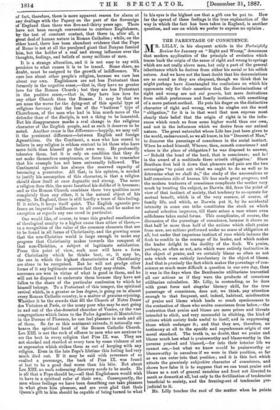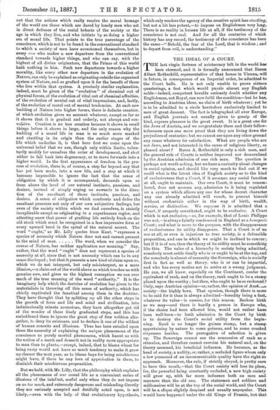THE PARENTAGE OF CONSCIENCE.
MR. LILLY, in his eloquent article in the Fortnightly Beriete for January on "Right and Wrong," denounces that modem application of the principle of evolution which traces back the origin of the sense of right and wrong to springs which are not really above man, bat only a part of the general inheritance which he derives from either his social or his selfish nature. And we have not the least doubt that his denunciations are as sound as they are eloquent, though we think that he might perhaps have disentangled the confusions on which his opponents rely for their assertion that the discriminations of right and wrong are not cut generic, but mere derivations from selfish preferences and family instincts, with something of a more patient method. He puts his finger on the distinctive character of right and wrong, when he singles out the word " obligation," for it is in that word that men express most clearly their belief that the origin of right is in the influ- ences which reach us from some higher world than our own, and not in the influences which we derive from our animal nature. The great naturalist whose Life has just been given to the world, endeavoured, as we all know, in his "Descent of Man," to discover the parentage of conscience in the social instinct. When he asked himself, Whence, then, cometh conscience ? and where is the place of obligation? he was disposed to answer,
Behold the bond of the herd, that is conscience; and lo ! in the award of a multitude there ariseth obligation.' Since Bentham first laid it down that pleasure and pain are the two sovereigns "to point out what we ought to do as well as to determine what we shall do," the study of the unconscious or half conscious side of human life has made great progress, and the modem traducers of conscience complicate the matter very much by treating the subject, as Darwin did, from the point of view of that instinct of society, that tendency to co-operate for mutual benefit, which is of the very essence, of course, of family life, and which, as Darwin put it, by its accidental intensity in some one tribe constitutes the stock on which natural selection improves, till there arises a race where even selfishness takes social forms. This complicates, of course, the discussion of the parentage of conscience, because it shows us ■ that half or more than half of the actions which elicit praise
from men, are actions performed under no sense of obligation at all, but under that imperious instinct of race which induces the flock to confide in the courage of-its leader, and which makes the leader delight in the docility of the flock. We praise, perhaps, as often as not, acts which were entirely instinctive in the object of praise, and we certainly blame as often as not acts which were entirely involuntary in the object of blame. And that is precisely the fact which makes the parentage of con- science so much more difficult a question in our own day, than it was in the days when the Benthamite utilitarians travestied all our actions as if they were the products of conscious utilitarian calculation. Mr. Lilly, in contending, as be does with great force and singular literary skill, for the true parentage of conscience, does not, we think, pay attention enough to that frequent, and, indeed, habitual, misdireotion of praise and blame which lends so much speciousness to the contention of those who evolve conscience from below,—the contention that praise and blame are mere prizes and threats intended to elicit, and very successful in eliciting, the kind of actions which society finds useful to itself, and in suppressing those which endanger it; and that they are, therefore, no testimony at all to the specific and superhuman origin of our moral standard. The truth is, no doubt, that we praise and blame much leas what is praiseworthy and blameworthy in the persons praised and blamed,—for into their interior life we cannot see,—but what we know would be praiseworthy or blameworthy in ourselves if we were in their position, so far as we can enter into that position ; and it is this fact which attests the genuinely subjective character of conscience, and shows how false it is to suppose that we can treat praise and blame as a sort of general sunshine and frost not directed to merit or demerit at all, but only to the fertilisation of tendencies beneficial to society, and the freezing-out of tendencies pre- judicial to it. Mr. Lilly touches the root of the matter when he points
out -that the actions which really receive the moral homage of the world are those which are dared by lonely men who act in direct defiance of the social behests of the society or the age in which they live, and who initiate by so doing a higher era of moral life. That points to the true parentage of the conscience, which is not to be found in the conventional standard to which a society of men have accustomed themselves, but in every one who makes a new departure from the conventional standard towards higher things, and who can say, with the highest of all divine originators, that the Prince of this world hath nothing in him. Such new departures towards a higher morality, like every other new departure in the evolution of Nature, can only be explained as originating outside the organised system of Nature, and as grafted upon it for the benefit of those who live within that system. A precisely similar explanation, indeed, must be given of the " evolution " of chemical out of physical forces, of the evolution of vital out of chemical affinities, of the evolution of mental out of vital impressions, and, lastly, of the evolution of moral out of mental tendencies. At each new budding of Nature into higher forms, there is definite creation, of which evolution gives no account whatever, except so far as it shows that it is gradual and orderly, not abrupt and con- vulsive. Creation is no less creation because it shows in small things before it shows in large, and the only reason why the budding of a moral life in man is so much more marked and startling in its origin than the earlier stages of the life which underlies it, is that here first we come upon the universal belief that we can, though only within limits, volun- tarily modify for ourselves the order of development, and elect either to fall back into degeneracy, or to move forwards into a higher world. In the first appearance of freedom in the pro. sees of evolution, there is, of course, a step far beyond any that has yet been made, into a new life, and a step at which it becomes impossible to ignore the fact that the sense of obligation by which it is accompanied, descends upon us from above the level of our natural instincts, passions, and desires, instead of simply urging us onwards in the direc- tion of the resultant of those instincts, passioas, and desires. A sense or obligation which confronts and defies the resultant pressure not only of our own subjective feelings, but even of the society within which we find ourselves, is strictly inexplicable except as originating in a superhuman region, and attesting anew that power of grafting life entirely fresh on the old stock which must be recognised in a less impressive form at every upward bend in the spiral of the natural ascent. The word " ought," as Hr. Lilly quotes from Kant, "expresses a species of necessity which Nature does not and cannot present to the mind of man The word, when we consider the course of Nature, has neither application nor meaning." Say, rather, that the word " ought" does not represent a species of necessity at all, since that is not necessity which can be in any sense disobeyed ; but that it presents a new kind of claim upon us, which we do not interpret, but only misinterpret, as a mere illusion,—a claim out of the world above us which touches us with genuine awe, and gives us the highest conception we can ever reach of the tree meaning of the word " authority." It is the imaginary help which the doctrine of evolution has given to the materialists in throwing off this sense of authority, which has chiefly captivated the fanatical among them in the doctrine. They have thought that by splitting np all the other steps in the growth of force and life and mind and civilisation, into infinitesimally minute accessions, they have altogether got rid of the wonder of these finely graduated steps, and this has emboldened them to ignore the great step of free volition alto- gether, to deny its existence, and to declare it one of the wildest of human conceits and illusions. Thus has been entailed upon them the necessity of explaining the unique phenomena of the conscience as purely morbid phenomena, which haunt ns with the notion of a merit and demerit not in reality more appropriate to man than to plants,—except, indeed, that to blame wheat for being rusty would not have so much tendency to make it grow up cleaner the next year, as to blame boys for being mischievous might have, if there be any love of approbation in theist, to diminish their mischievous propensities.
But we hold, with Mr. Lilly, that the philosophy which explains all the phenomena of our moral life as a convenient series of illusions of the intellect, useful only when they do not impose on us too much, and extremely dangerous and misleading directly they are seriously accepted and dutifully acted upon, is not likely,—even with the help of that evolutionary hypothesis, which only renders the agency of the creative spirit less startling, but not a bit less potent, —to impose on Englishmen very long. There is no reality in human life at all, if the testimony of the conscience is not real. And for all the centuries of which history has any record, the testimony of the conscience has been the same—" Behold, the fear of the Lord, that is wisdom ; and to depart from evil, is understanding."







































 Previous page
Previous page